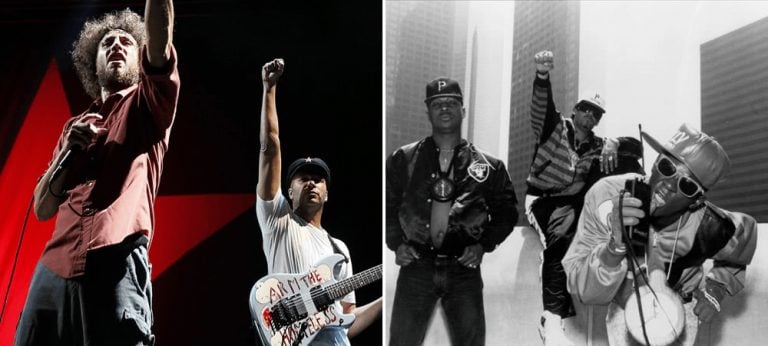With members of two incredibly influential acts in Public Enemy and Rage Against The Machine joining forces to form Prophets Of Rage, we’ve been given one of the most powerful super groups of the decade.
With the band set to make their first ever appearance in Australia for the inaugural Download Festival Australia and a run of sideshows next month, we’re looking back at the monumental careers of each and trying to see which era-defining act has ultimately had the most influence on music – and culture.
But first, a disclaimer: Cypress Hill, we love you, but your music is only influential insofar as making us really want Cheese and Bacon Balls, Jolt cola, and Futurama with the sound down. Maybe if ‘Legalise It’ from Black Sunday is cited as the direct reason that many U.S. states are relaxing their legislation around marijuana, Cypress Hill may have a case, but until then…
Now, the other groups.
Public Enemy
Along with NWA, Public Enemy brought the visceral anger of an oppressed minority to the mainstream without softening anything. Fuelled by Chuck D’s political poetry, and driven by a production style that sounds more like the apocalypse than the cruising music or party jams of their contemporaries, PE hit hard in 1987 with their first album Yo! Bum Rush The Show and everything changed.
This is because Public Enemy meant war. More than this, they were living in a war-zone, and were reporting from the front lines.
While the monstrous success of Michael Jackson’s Thriller in 1982 and his subsequent crossover to MTV (who refused to playlist black artists, before Jackson’s ubiquity and the quality of his videos made him impossible to ignore) is often cited as the moment black music crossed over in the mainstream, in truth it took Public Enemy’s peerless run of four albums from 1987-1991 to really change the landscape.
Love Music?
Get your daily dose of metal, rock, indie, pop, and everything else in between.
Those four albums planted hip hop culture inside suburban homes, addressing hard hitting topics such as power structures, police violence, institutional racism, even the failures of the 911 system in servicing disadvantaged (read: black) communities. That they did so without compromising their poetry or the politics, without shielding the message or shying away from controversy.
Public Enemy’s fingerprints can be found in every strain of conscious hip hop popular now: from the politically-driven rhymes of Kendrick Lamar, to the righteous anger of Run The Jewels, and the sonic chaos and doom of Yeezus.
Historically, Public Enemy are roundly considered one of the most important American art collectives of the 20th century. In 2003, the Library of Congress added their 1990 album Fear Of A Black Planet— to the National Recording Registry, which preserves recordings that “are culturally, historically, or aesthetically important, and/or inform or reflect life in the United States.”
Enough said.
Rage Against The Machine
It’s hard to rage against the machine when you are employees of a multi-national corporation, as the members of RATM were in 1992 when they released their blistering debut album through Epic Records, a subset of the Sony Corporation. “We never saw a conflict as long as we maintained creative control”, Tom Morello said at the time, although they must have been ready for cries of hypocrisy.
Luckily, the album was just too damn important for it to matter who was footing the bill.
RATM’s anger extended well past the corporate structure of entertainment conglomerates, too, with lyrics targeting the Klu Klux Klan, police brutality, the oil industry, media coverage of the Persian Gulf War, and numerous other hot button topics. They protested on live TV, they stormed the streets, and they walked the wall.
They were uncompromising in their politics, which is a stance that has influenced many young angry idealistic bands, but stylistically they unwittingly spawned the nu metal genre, who took RATM’s blend of high-register rapping, impassioned screaming, and barrages of guitar riffage, and left behind the politics. The result was the watered-down studied-anger of nu-metal bands who were hugely popular around the turn of the century, but ultimately proved a fad: shallow, and misogynistic.
More pleasingly, Rage Against The Machine also influenced a generation of guitarist; ‘Killing In The Name Of’, Guerilla Radio’ and ‘Bulls On Parade’ are among the earliest songs most fledgling guitarists/garage bands learn how to play, and Morello’s pedal-warped solos opened up many young ears to the endless possibilities of a whammy bar, a few shitty pedals and the joy of feedback.
Plus, I challenge you to find a single covers band in Australia that doesn’t play ‘Killing In The Name’.
So, who wins?
While Rage Against The Machine were more stylistically influential — arguably spawning an entire genre that collectively sold hundreds of millions of records within a handful of years — Public Enemy’s uncompromising lyrical skill, their focus on the politic issues impacting their downtrodden community, and the fact that today’s biggest rap artists seem to take lyrical cues from Chuck D even now, 31 years later, makes their impact a more lasting one.
However, there’s no loser in this contest, and they definitely ain’t done yet, as Prophets Of Rage sees them team up to continue their mission, as vital a voice as ever.
Catch them when they head to Australia for the first time next month to play the inaugural Download Festival Australia and a run of sideshows, and check out our perfect setlist below, along with full tour dates.
Prophets Of Rage Australian tour
w/ special guests
Thursday, March 26th
Hordern Pavilion, Sydney, NSW (LIC/AA)
Tickets: Live Nation
Monday, March 26th
Riverstage, Brisbane, QLD (LIC/AA)
Tickets: Live Nation
Also appearing at Download Festival Australia
Saturday, March 24
Flemington Racecourse, Melbourne, VIC (LIC/AA)
Tickets on sale now


































